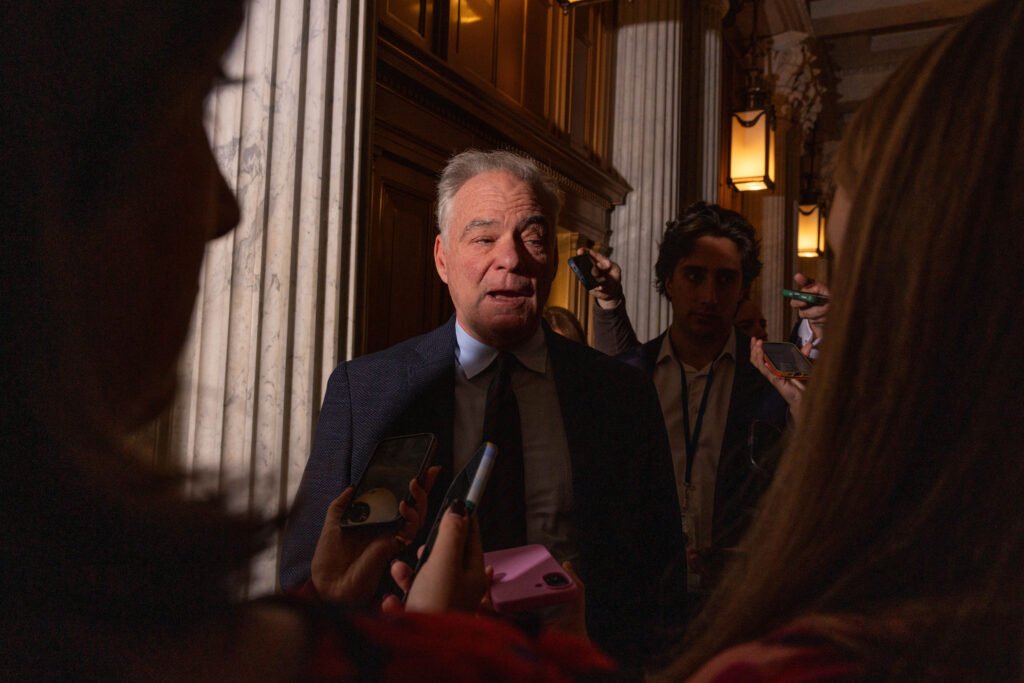
Tim Kaine privately laid out weeks ago what he needed in return for his vote to end the government shutdown: a “moratorium on mischief.”
That’s what the Virginia Democrat told Senate Majority Leader John Thune that any deal had to include — undoing the firings President Donald Trump and budget director Russ Vought had carried out since the start of the shutdown, as well as protections against future firings of federal workers, who make up a significant portion of Kaine’s constituency.
It was a demand that Kaine wasn’t sure the White House and Trump would agree to fully meet until the final hours before the nail-biter vote Sunday that cemented a bipartisan breakthrough.
“There was a lot of resistance but they needed my vote,” Kaine said about the GOP reaction to his demands, adding that negotiators “reached a meeting of the minds” at about 5:45 p.m. Sunday.
About five hours later, the Senate voted to move forward with legislation ensuring any federal workers laid off during the shutdown are rehired and blocking future reductions in force, or RIFs, through at least the end of a new Jan. 30 stopgap spending bill.
Most of the attention to the six weeks of shutdown negotiation centered on Democrats’ demands surrounding health care, particularly the extension of key expiring health insurance subsidies. But the RIF language was the final piece that helped clinch the deal, according to interviews with six people involved in the bipartisan negotiations.
With only eight members of the Democratic caucus voting to advance the bill — the bare minimum for it to move forward — satisfying Kaine was critical to ending the conflict largely on the GOP’s terms while also giving Democrats, who have long worried about Trump taking a sledgehammer to the federal government, something to hold up as a consolation prize.
Kaine was, by his own admission, a latecomer to the bipartisan talks, only joining late last week. Sens. Jeanne Shaheen (D-N.H.) and Angus King (I-Maine) began talking with Republicans the first night of the shutdown, by Shaheen’s account. The core group of negotiators included Sens. Maggie Hassan (D-N.H.), Susan Collins (R-Maine) and Katie Britt (R-Ala.), among others.
Shaheen, asked about the RIF language, said that it was “something the White House put on the table weeks ago as something they were willing to take a look at.” Britt also said in an interview the idea was in the mix as she, Collins, Shaheen and others discussed possible paths to reopen the government.
But while senators spent weeks quietly circling around the same rough framework, they weren’t able to secure a breakthrough.
Things began to shift late last week, as Democrats’ elation over their big Election Day wins began to wear off and the reality of a record-setting shutdown — including unpaid federal workers, worsening air travel delays and missing food aid — began to set in.
Kaine gave a proposal Friday to Thune’s team and Collins, he recounted in an interview Monday. That sparked around-the-clock negotiations over the RIF language over the weekend, including direct talks starting Sunday morning between Kaine and Britt, an appropriator and key emissary between the various negotiators and the White House.
“I think I got off the phone at 12:30 a.m. [Sunday], I think Susan Collins was up for an hour past that and then at 5 a.m. I started getting text messages about this,” Britt said. “Tim Kaine and I talked a number of times both on the phone and in person.”
While senators were hammering out the RIF language, Collins and other appropriators were working to lock down another piece of the shutdown puzzle: a three-bill funding package that included money for veterans programs, food aid and other agencies, as well as Congress itself. Agreeing to the three bills, Democrats and Republicans believe, was key to helping rebuild enough trust to notch a broader deal to end the shutdown.
Senators and staff “worked night and day, literally,” Collins said Monday night after the bill passed. “It shows the Senate can work, we can produce the results that are needed.”
At the same time, Shaheen, King and Hassan led the effort to privately persuade their fellow members of the Senate Democratic Caucus that the agreement was the best offer they were going to get from Republicans, who hadn’t shifted in six weeks on their refusal to negotiate over the expiring Affordable Care Act subsidies.
In the end, that wasn’t enough to get most members of the Senate Democratic caucus — including Minority Leader Chuck Schumer, who told members involved in the talks about two weeks ago he could not support the deal they were sketching out, according to a person granted anonymity to discuss details of the negotiations.
Schumer continued privately urging them to hold out even as they moved to concede this week, the person added. But the senators had seen enough.
“This was the option on the table,” Shaheen said Monday. She added that some Democratic colleagues who voted against the deal privately told her, “I’m so glad you did that, but I’m not going to vote with you.”
With Thune and Schumer at loggerheads, senators on both sides engaged in on-and-off shuttle diplomacy.
Britt, notably, spoke with Schumer late last month — a conversation aimed, she said, at making sure he was open to allowing the trio of full-year spending bills to move forward. Shaheen, Hassan and King met with Thune, who pledged that he would give them a vote on an ACA extension bill that they would have until mid-December to draft.
“We sat across from him, we looked him eye to eye,” Shaheen said about the talks with Thune.
The trio met repeatedly with each other, as well as a group of roughly a dozen Senate Democrats that eventually included Sen. Dick Durbin of Illinois, the party’s whip and highest-ranking Democrat who backed the effort. Durbin said he also spoke with Thune on Sunday, telling the South Dakota Republican that “I was counting on him to keep his word” on the ACA vote.
“He assured me he would,” Durbin added.
Thune publicly reiterated his commitment to the vote Monday, though he stopped well short of predicting a breakthrough.
“I think there’s some goodwill on this issue,” he told reporters. “We’ll see if something lands.”
On the Republican side of the aisle, Collins kept in close contact with senators as she worked to lock down the appropriations bills and close out a deal that would reopen the government.
Collins had privately pitched a six-point plan for ending the shutdown, and the eventual deal largely aligned with what she set out: enacting the three-bill “minibus,” teeing up another package of full-year bills, guaranteeing back pay for furloughed employees, promising the ACA vote, beefing up security funding for lawmakers and passing a stopgap bill to reopen all agencies.
Trump never engaged directly with Democrats after an unfruitful late-September meeting with the top party leaders. But GOP senators, including Britt, made sure the White House was on the same page as what was being discussed among the lawmakers. Britt identified Vice President JD Vance, White House deputy chief of staff James Blair and director of legislative affairs James Braid as the key officials who helped land the shutdown agreement.
Vance, Britt added, told her “whatever you need, just let me know.”
The open line to the White House came in handy in the final 48 hours, as Britt, Kaine and other senators hashed out the final terms of the RIF agreement.
“Obviously the White House set the framework, and Senator Kaine knew what he needed to achieve,” Britt said, describing her role as “being a conduit … and trying to make sure nothing got lost in translation.”
Katherine Tully-McManus contributed to this report.


